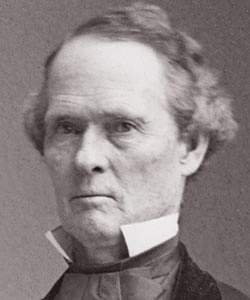Joseph Lane (Congressional Biographical Directory)
Reference
LANE, Joseph, (father of La Fayette Lane and grandfather of Harry Lane), a Delegate and a Senator from Oregon; born in Buncombe County, N.C., December 14, 1801; moved with his parents to Henderson, Ky., in 1810; attended the common schools; worked in a general store; moved to Vanderburg County, Ind., in 1821 and farmed; elected to the first of several terms in the State house of representatives in 1822; member, State senate 1844-1846; during the Mexican War, led a brigade in several battles; brevetted major general in 1847; appointed by President James Polk to be governor of the Territory of Oregon 1849-1850, when he resigned; unsuccessful candidate for the Democratic presidential nomination in 1852; elected as a Delegate from the Territory to the Thirty-second and to the three succeeding Congresses and served from June 21, 1851, until February 14, 1859, when the Territory became a State; upon the admission of Oregon as a State into the Union in 1859 was elected as a Democrat to the United States Senate and served from February 14, 1859, to March 3, 1861; did not seek reelection in 1860, having become a candidate for Vice President; chairman, Committee on Engrossed Bills (Thirty-sixth Congress), Committee on Revolutionary Claims (Thirty-sixth Congress); unsuccessful candidate for Vice President of the United States on the Democratic ticket in 1860; died in Roseburg, Oreg., April 19, 1881; interment in the Masonic Cemetery.
"Lane, Joseph," Biographical Directory of the United States Congress, 1774 to Present, http://bioguide.congress.gov/scripts/biodisplay.pl?index=L000062.
Joseph Lane (American National Biography)
Scholarship
National politics finally divided Oregon Democrats…, with Lane at the center of the controversy. Currying southern favor in Congress and at the same time convinced of the slaveholder's right to bring slaves into any territory, the pugnacious Lane showed his hand most dramatically by offering to be Preston Brooks's second when the latter challenged two northern congressmen to duels in 1856. This followed Brooks's vicious caning of the outspoken antislavery senator Charles Sumner of Massachusetts. Lane headed that faction of his party most closely identified with President James Buchanan and his position favoring legalization of slavery in Kansas Territory. Bush in turn aligned his wing of the party with Stephen A. Douglas and his insistence that Kansans be afforded the right to decide, through the process known as popular sovereignty, whether slavery would be permitted in the territory. Lane's outspoken defense of the Buchanan-endorsed, proslavery Lecompton constitution led to the division of the Oregon Democratic party, and the Bush faction allied with the newly formed Republican party of Oregon in support of Douglas and popular sovereignty. When the House of Representatives delayed an Oregon statehood bill in 1858, it was widely believed to be in punishment of Lane and his proslavery allies. Oregon finally achieved statehood in February 1859. Even before Congress acted, Oregon had organized a state government, and Lane again revealed his political influence when the legislature elected him to the U.S. Senate.
Frederick J. Blue, "Lane, Joseph," American National Biography Online, February 2000, http://www.anb.org/articles/04/04-00613.html.



